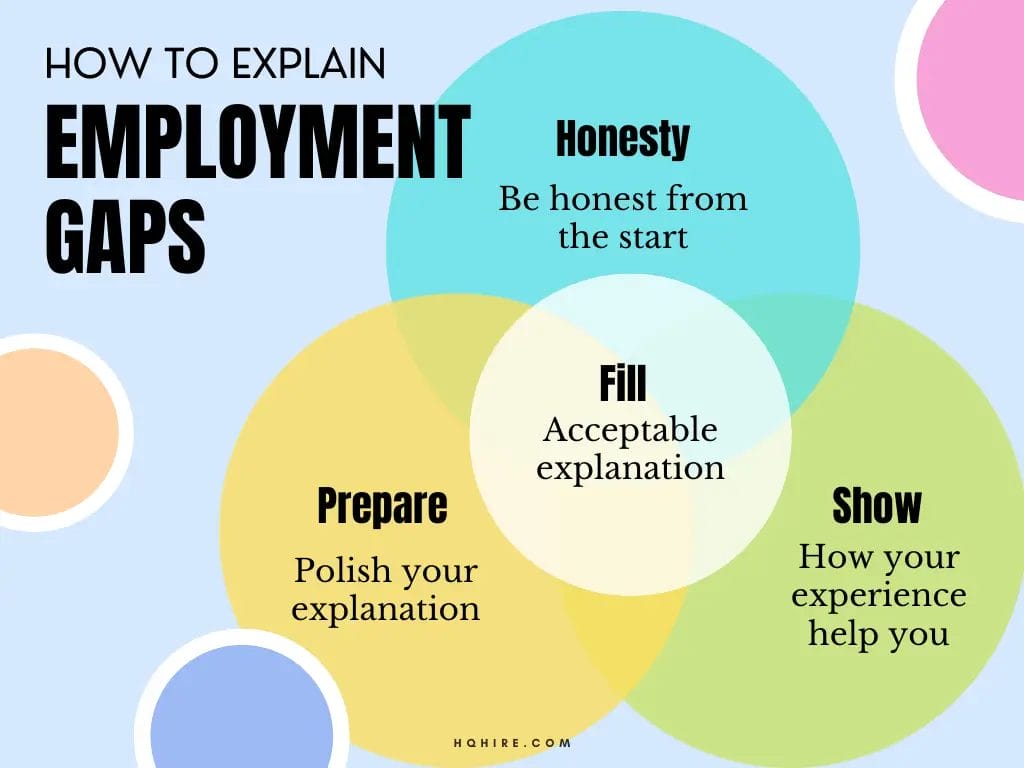It’s not unusual to have an employment or career gap. Maybe you took some time off to raise a family or maybe you’ve been unemployed for a while.
Whatever the reason, and how long you’ve been unemployed, you’ll need to be able to explain your employment gap when you’re job hunting.
If you find yourself in an interview it’s a good sign: Clearly, the company sees potential in you and wants to understand you further when determining your compatibility for the job.
How to Explain Employment Gap to Your Employer
When recruiters and employers are talking to you about your experiences and workplace history, they are not only looking for your qualifications and job readiness but also your capabilities away from the workplace.
Having a logical and acceptable answer to explain your gap in employment ready will give you the best shot at landing the job.
Here is how you answer employment gaps.

Be honest from the start
It’s highly unlikely that your potential employer won’t notice the gaps in your resume. You might be tempted to alter the dates and extend the amount of time you were employed to minimize these spaces. However, recruiters are likely to uncover your dishonesty when they do a reference check.
If you’re honest from the start, good employers will recognize your decency and see it for what it is: a wonderful quality in potential employees.
Show how your experience has helped you
Many people have gaps in their resumes. When discussing them, always try to frame the situation in a positive light. Describe how the things you’ve done during your employment gap have shown your capability in displaying strength, flexibility, or independence in face of challenges.
These are all qualities that recruiters want to see in potential employers. It’s about resilience and being able to handle difficult and challenging situations.
Be as positive as possible
Keep your answer positive. Try to emphasize what you learned during that time, such as new skills, knowledge, or abilities.
Think about the positive outcome that the employment gap has given you to have an edge over other candidates.
Prepare beforehand
Being prepared is the best way to put yourself in the best light, especially if you, like most of the candidates, get flustered when put into nervous situations.
With a polished explanation for the gap in your resume, you will have no trouble putting the situation in the most positive light possible.
If you have a gap in your resume because you were looking for work, you should emphasize that you were looking for the job that was the best fit.
It’s also a good idea to highlight the beneficial things you did while you were looking, like doing volunteer work, or taking up an online course to better equip yourself for the future or further education.
This will make you look discerning and focused, not just willing to take the first job that comes your way, but knowing what you want and your goal in your career.
Fill the gaps
Although employment gaps are quite common; 59 percent of Americans have an employment gap at some point in their career. It is still a good idea to fill in the gaps to make your resume and interview easier and more smooth sailing.
- If you have short employment gaps of over a few weeks to less than 2 months, list your employment in months rather than using exact dates.
- If you have smallish employment gaps of 2 to 3 months maximum, list your employment periods in years rather than months.
- If you have long employment gaps of more than 3 months, provide a brief note in the resume listing the reason why. For example, you could write ‘I had a hiatus while I was renovating my parents’ house.’
Employment gaps are common and as long as the employment gap is reasonable, most employers will accept it as it is.
But knowing how to fill in the gaps will help you to avoid awkward questions which can increase your chances of getting hired.
Why Do People Have Gaps in Employment
There are many reasons why employees have employment gaps, ranging from taking care of the family to going back to school or being unemployed due to a recession or a laid off. Each employee has their own reasons for leaving their job, and some are more common than others.
According to a survey, 3 in 5 Americans (59%) have employment gaps in their career for one or more reasons.
- Family reasons (48%)
- Being laid off (37%)
- Break from work (18%)
- Being fired (16%)
- Further studies (13%)
Family reasons are the primary reason why employees take gaps between their employment, this includes;
- Taking time off work to raise a family which consists of 18% of the respondents. Women are found 2.9 times more likely to have employment gaps due to this reason than men.
- Maternity and paternity leave consists of 15% of the respondents. Women are found 2.6 times more likely to have employment gaps due to this reason than men.
- Need to take care of sick family members which consist of 15% of the respondents. Young Americans (Aged 18-34) are 2.2 times more likely than older Americans (Aged 35-65).
Although the length of the employment gap matters when you are finding a job, the reasons for the employment matter just as much.
Whatever the reason for employment gaps it is a good idea to prepare to answer the question prior to an interview or note it down in a resume if necessary.
Here are a few examples of how to explain a gap in employment.
How To Explain Employment Gaps In an Interview
During an interview, your interviewer may ask you to explain the gaps in your employment, and here are a few points you need to address in your explanation.
1. Why did you leave your last job?
The reason why you’ve left your last job will determine what kind of person are you. There are many reasons why someone left their last job, some are widely acceptable, while others are red flags for potential employers.
Examples of acceptable reasons:
- Take care of sick family members.
- Taking time off to raise your kids.
- Taking time off for further studies.
- Getting laid off.
Examples of unacceptable reasons (red flags):
- Left your job because you hate your boss
- Left your job because you hate your job
- Left your job because you can’t fit into the team
2. What have you done since you left your last job?
The things you do since you’ve left your last job need to be somewhat linked to the reason why you left your last job.
Here you can take about the things you have done and how these things have helped you grow your soft skills or hard skills.
Examples of the things you have done:
- Taking care of a sick family member.
- Having further studies which can help you in your career.
- You are actively finding a job during this period.
Regardless, you need to paint a positive light on the things you’ve done and show that you are committed to preparing yourself for your next job.
3. Why you are available to work now?
What has changed, and how this change has allowed you to come back to work?
You need to address, why you are now able to come back to work, and the same reason why you left your previous job will not lead you to leave this job if you are hired.
Example of the reason why you are able to come back to work:
- A sick family member has recovered from their illness thanks to your undivided care.
- Finish further studies and achieved professional certification.
- Your kids are old enough to go to school which does not require you to spend so much time with the kids anymore.
The employers are concerned if you are able to contribute to the company for the long term, and you need to address their concerns.
Examples of How To Explain Employment Gaps
Here we will list down some examples of how you can explain to an interviewer the gap in your employment.
Answering Employment Gap after Graduation
“I took a gap year after my graduation from the University of ABC, during this period I joined traveled to 5 countries to gain an understanding of the different cultures. I have learned the importance of diversity and acceptance of people with different values. My experiences have also thought me how to communicate effectively with people of different cultural backgrounds. I believe my experience will bring value to the team and help me in advancing in my career.”
Answering Employment Gap due to Personal Reasons
“I need to leave my previous position to care for my aging parent. Recently, I am able to hire a full-time caregiver that I can trust, thus I am now fully available to be committed to work. Thus, with my previous work experience, I know I’m ready to focus on finding a nursing supervisor or lead position that will help me advance my career.”
Answering Employment Gap due to Health Issues
“I need to leave my previous position as I require recuperation from my hand surgery. After a year of resting and physiotherapy, I’ve fully recovered and was advised by my doctor, that I am able to perform all tasks prior to my injury. I am now fully available to be committed to work. So when I saw this job opening, I know with my previous work experience, I am a good candidate for the position. Thus, will like to understand more about the role and responsibility.”
Answering Employment Gap due to Marriage
“I left my previous job as I need to make preparation for my marriage and move into another city. During these few months, I’ve settled into a new environment and I am ready to be fully committed to work. With my previous work experience, I know I will be able to perform in the role. Thus, will like to understand more about the role and responsibility.”
Answering Employment Gap due to the Pandemic
“I left my previous job 10 months ago due to the pandemic. I started my job search immediately, but as the industry was hit badly by the pandemic, the jobs that suit my skills and experience are hard to find. During these few months, I took a few online courses while actively finding a management role to advance my career. With the new skills and knowledge, I’ve gained, I believe I am qualified for the position and contribute to the team.”
Answering Employment Gap due to Laid Off
“I was laid off 7 months ago due to the downsizing of the company. I started my job search a few months ago, and I’m currently looking for a supervisory role to continually advance my career. During this time, I’ve had a number of job interviews but have not found the right fit. The main thing that I am looking for is the opportunity to lead my own team. So when I saw that this was mentioned in the job description, I think this role is what I am looking for. Can you let me know more about the role?”
Read Also:
- How to Become a Remote Developer: Your Complete Guide to a Digital Nomad Career
- How to Become a Blockchain Developer: Complete Guide to a Career in Blockchain Technology
- How to Become a SQL Developer: Complete Guide to a Career in Database Development
- How to Become a Freelance Travel Writer (Step-by-Step Guide)
- How to Become a Remote Freelance Technical Writer (Step Guide)
Join over 11,000+ achievers who are committed to achieving their career goals!






